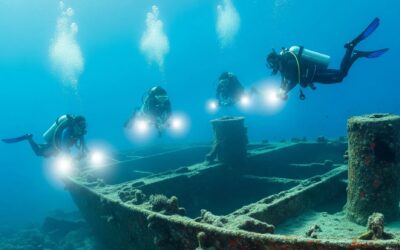The Importance of Medical Fitness in Scuba Diving
Getting ready for your next dive trip? Are you fit to dive? Scuba diving is an exhilarating activity that offers a unique opportunity to explore underwater worlds exploring stunning marine life and beautiful landscapes. However, the nature of the sport requires you to be in good health, as it places significant physical demands on your body. Ensuring your medical fitness for scuba diving is crucial for your safety and enjoyment, whether you’re a certified diver or a non-certified participant.
Why Medical Fitness in Scuba Diving Matters
1. Pressure Changes: As you descend and ascend, you experience changes in pressure. These changes can affect various body systems, particularly your ears, sinuses, and lungs. Medical conditions affecting these areas can lead to serious complications such as barotrauma.
2. Cardiovascular Strain: Diving can put additional stress on your cardiovascular system. Conditions such as heart disease, high blood pressure, and certain respiratory disorders can increase the risk of a medical emergency underwater, where access to immediate medical care is limited.
3. Fitness and Stamina: The physical activity involved in diving, such as swimming against currents or dealing with potential underwater challenges, requires a reasonable level of physical fitness. Poor fitness levels can result in exhaustion, increasing the risk of accidents and decompression sickness.
Mandatory Medical Questionnaires
Recognizing the importance of medical fitness, many countries as well as diving associations have implemented stringent regulations to ensure the safety of divers. For instance, Spain requires all participants—whether you’re certified or non-certified—to complete a medical questionnaire before diving. This practice helps identify individuals who may have medical conditions that could pose a risk during a dive.
The medical questionnaire typically covers a wide range of health issues, including but not limited to:
- Cardiovascular conditions
- Respiratory issues such as asthma
- Ear, nose, and throat problems
- Neurological disorders
- Diabetes and other metabolic disorders
- Recent surgeries
- Prescriptive medication
Dive instructors are not doctors and cannot evaluate your medical condition. Therefore, it is your responsibility to thoroughly read and understand the prerequisites. Ideally, you should go through the medical questionnaire prior to booking a diving-related activity. This allows you to determine in advance if you require medical clearance, thereby avoiding the scenario of showing up for a booking and being excluded from a dive. Most dive operators inform about the requirements on their website. It is also a good idea to review the cancellation policy as most likely dive operators might not permit refunds if you lack the necessary medical clearance when showing up for the activity.
Medical Clearance and Written Statements
For some individuals, the medical questionnaire might indicate the presence of conditions. No worries, a pre-existing medical condition does most likely no exclude you from diving. However, it might require further evaluation prior to diving. In such cases, you would need to obtain medical clearance from a physician. Depending on your condition this clearance might involve a detailed medical examination and, if necessary, specialized tests to assess your fitness for diving.
A written medical statement from a physician serves several important purposes:
Verification: It confirms that you have been evaluated and are deemed fit to participate in diving activities.
Documentation: It provides a record that the dive operator and instructor can use to ensure compliance with local regulations and safety protocols.
Risk Management: It helps mitigate potential legal and liability issues for both you and the dive operator in the event of a medical emergency.
Responsibility of Dive Instructors and Centers
Your instructor and the dive center bear significant responsibility for you while you’re in the water. They must adhere to local laws and the standards of the diving association. Ensuring that you have completed the medical questionnaire and obtained necessary medical clearance is part of their duty to maintain safety and compliance.
Regular Medical Consultations for Medical Fitness in Scuba Diving
It is also important to note that just because you have been diving in the past with operators that did not follow the laws does not mean that these regulations do not exist. Generally, it is recommended that all certified divers, including you, regularly consult a doctor to ensure ongoing medical fitness. A medical statement, assuming no significant changes in health, is typically valid for 24 months in most countries. Dive professionals though commonly require a medical statement every 12 months, independently of pre-existing medical conditions.
Conclusion
Medical fitness in Scuba Diving is a critical aspect for safety. The requirement to complete a medical questionnaire and, when necessary, obtain medical clearance ensures that you are physically capable of handling the demands of the underwater environment. This practice, mandated in countries like Spain, underscores the commitment to preserving your well-being and enhancing your overall diving experience.
By prioritizing your medical fitness, you can enjoy the wonders of the underwater world with greater confidence and security, knowing that you are prepared to handle the unique challenges that come with this exciting sport. Always take proactive steps to ensure you meet medical prerequisites, thus safeguarding your health and ensuring a smooth and enjoyable diving adventure.
Want to feel more safe underwater? Read through our free buoyancy workshops and improve your skills from the sofa.



